英语写作训练方法之常用句式(doc 9页)
20个英语作文万能句式
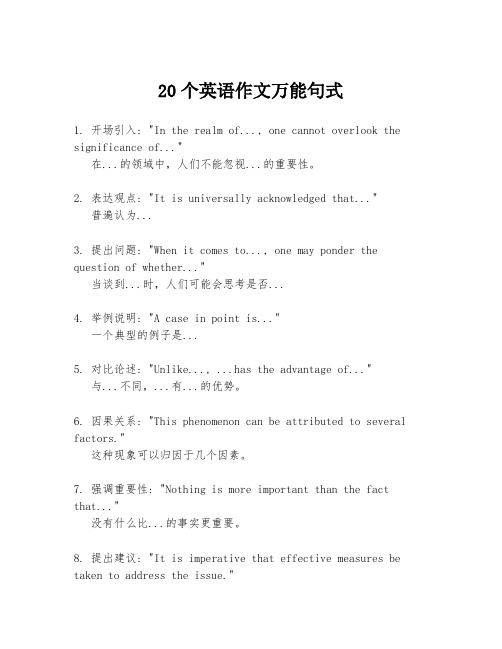
20个英语作文万能句式1. 开场引入: "In the realm of..., one cannot overlook the significance of..."在...的领域中,人们不能忽视...的重要性。
2. 表达观点: "It is universally acknowledged that..."普遍认为...3. 提出问题: "When it comes to..., one may ponder the question of whether..."当谈到...时,人们可能会思考是否...4. 举例说明: "A case in point is..."一个典型的例子是...5. 对比论述: "Unlike..., ...has the advantage of..."与...不同,...有...的优势。
6. 因果关系: "This phenomenon can be attributed to several factors."这种现象可以归因于几个因素。
7. 强调重要性: "Nothing is more important than the fact that..."没有什么比...的事实更重要。
8. 提出建议: "It is imperative that effective measures be taken to address the issue."必须采取有效措施来解决这个问题。
9. 总结前文: "In summary, ...plays a crucial role in..."总之,...在...中扮演着至关重要的角色。
10. 展望未来: "Looking ahead, it is anticipated that..."展望未来,预计...11. 引用名人名言: "As Abraham Lincoln once said, '...'"正如亚伯拉罕·林肯曾经说过的,“...”。
英语作文常用简单句式
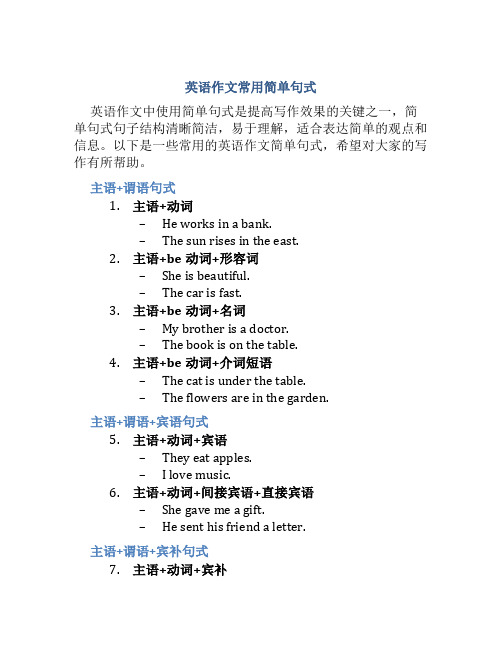
英语作文常用简单句式英语作文中使用简单句式是提高写作效果的关键之一,简单句式句子结构清晰简洁,易于理解,适合表达简单的观点和信息。
以下是一些常用的英语作文简单句式,希望对大家的写作有所帮助。
主语+谓语句式1.主语+动词–He works in a bank.–The sun rises in the east.2.主语+be动词+形容词–She is beautiful.–The car is fast.3.主语+be动词+名词–My brother is a doctor.–The book is on the table.4.主语+be动词+介词短语–The cat is under the table.–The flowers are in the garden.主语+谓语+宾语句式5.主语+动词+宾语–They eat apples.–I love music.6.主语+动词+间接宾语+直接宾语–She gave me a gift.–He sent his friend a letter.主语+谓语+宾补句式7.主语+动词+宾补–I find the book interesting.–She made him happy.主语+谓语+宾语+宾补句式8.主语+动词+宾语+宾补–He painted the wall red.–They elected him president.主语+系表结构9.主语+系动词+表语–She looks tired.–The milk smells sour.以上这些常用的英语作文简单句式可以帮助大家在写作过程中更加清晰地表达思想,提升写作的效果。
希望大家能够灵活运用这些句式,写出更加流畅、连贯的英语作文。
英文作文总结句式
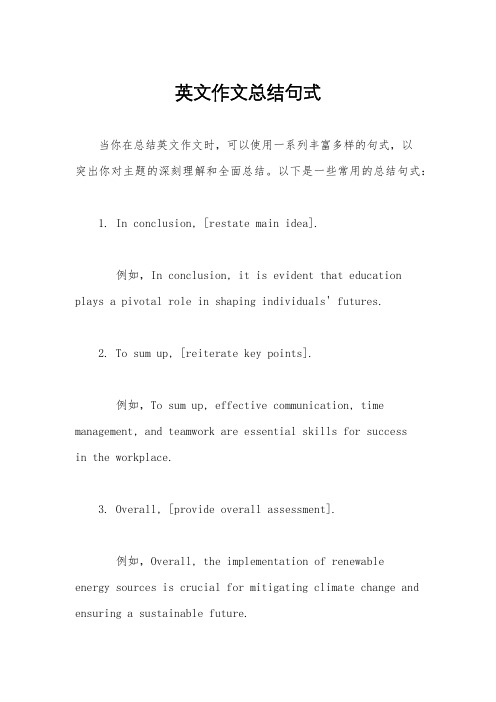
英文作文总结句式当你在总结英文作文时,可以使用一系列丰富多样的句式,以突出你对主题的深刻理解和全面总结。
以下是一些常用的总结句式:1. In conclusion, [restate main idea].例如,In conclusion, it is evident that education plays a pivotal role in shaping individuals' futures.2. To sum up, [reiterate key points].例如,To sum up, effective communication, time management, and teamwork are essential skills for successin the workplace.3. Overall, [provide overall assessment].例如,Overall, the implementation of renewableenergy sources is crucial for mitigating climate change and ensuring a sustainable future.4. In summary, [briefly summarize main arguments].例如,In summary, the novel explores themes of love, sacrifice, and the pursuit of identity through the lens of its diverse characters.5. To conclude, [present final thoughts].例如,To conclude, the government should prioritize policies that promote economic equality and social justice for all citizens.6. Taking everything into account, [offer comprehensive perspective].例如,Taking everything into account, it is clear that globalization has both positive and negative impacts on local economies and cultures.7. In light of these points, [draw final conclusion].例如,In light of these points, it is imperativethat individuals take proactive measures to reduce their carbon footprint and combat climate change.8. All things considered, [restate main idea and implications].例如,All things considered, the rise of artificial intelligence presents both opportunities and challenges for the future of work and society.9. On the whole, [provide overall assessment].例如,On the whole, technological advancements have revolutionized various aspects of human life, from communication to healthcare.10. To summarize, [briefly encapsulate main arguments].例如,To summarize, the research highlights the importance of early childhood education in fostering cognitive development and academic success.这些句式可以帮助你有效地总结英文作文,突出重点,展示对主题的全面理解。
英语作文写作句型:17种基本句子
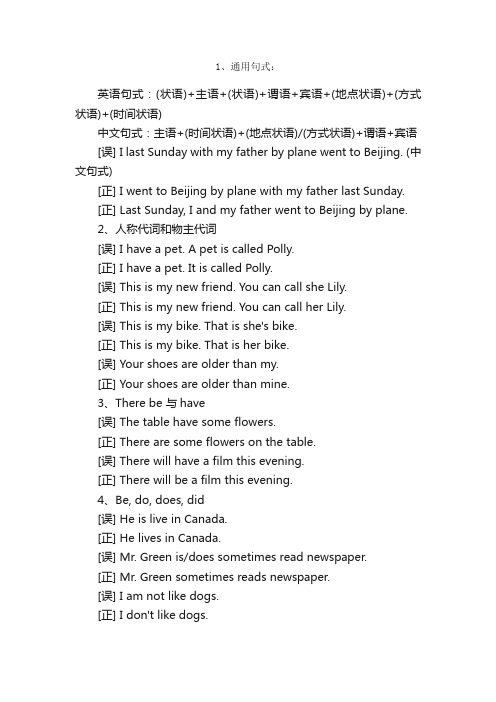
1、通用句式:英语句式:(状语)+主语+(状语)+谓语+宾语+(地点状语)+(方式状语)+(时间状语)中文句式:主语+(时间状语)+(地点状语)/(方式状语)+谓语+宾语[误] I last Sunday with my father by plane went to Beijing. (中文句式)[正] I went to Beijing by plane with my father last Sunday.[正] Last Sunday, I and my father went to Beijing by plane.2、人称代词和物主代词[误] I have a pet. A pet is called Polly.[正] I have a pet. It is called Polly.[误] This is my new friend. You can call she Lily.[正] This is my new friend. You can call her Lily.[误] This is my bike. That is she's bike.[正] This is my bike. That is her bike.[误] Your shoes are older than my.[正] Your shoes are older than mine.3、There be 与have[误] The table have some flowers.[正] There are some flowers on the table.[误] There will have a film this evening.[正] There will be a film this evening.4、Be, do, does, did[误] He is live in Canada.[正] He lives in Canada.[误] Mr. Green is/does sometimes read newspaper.[正] Mr. Green sometimes reads newspaper.[误] I am not like dogs.[正] I don't like dogs.[误] Jenny wasn't call me last night.[正] Jenny didn't call me last night.[误] Our English teacher in the office.[正] Our English teacher is in the office.5、can, may, must, should, couldI can sing and dance.We should keep quiet in the reading room.6、will, shall, be going to[误] Jack will comes to China next week.[正] Jack will come to China next week.We shall go for a picnic next week.Mr. Green is going to buy a car next month.7、and, but, or, too, alsoMy favorite holidays are spring and fall.My father likes watching TV. I like watching TV, too.[误] October is not too cold and cold in Quanzhou.[正] October is not too cold or cold in Quanzhou.[误] I like English, and I don't like math.[正] I like English, but I don't like math.8、sometimes, often, always, usually, never, hardly, all the timeIn the morning, my father always plays sports.= In the morning, my father plays sports all the time.9、for example, such as,We will do some activities, such as going boating, climbing hills, playing games, having a picnic and so on.We should help the old. For example, we can clean the house, carry water and tell interesting stories.10、作比较I think football is as popular as basketball in America.English is not so/as easy as Chinese.I think math is more/less interesting than art.Of all the subjects, I think English is the most interesting.July is the hottest in a year.11、复合句[误] If it will be sunny tomorrow, we can play a football game.[正] If it is sunny tomorrow, we can play a football game.[误] When the summer will come, the weather will get hotter and hotter.[正] When the summer comes, the weather will get hotter and hotter.12、以事物作主语的句子[误] I hope I will come true my dream.[正] I hope my dream will come true.[误] T om happens a traffic accident.[正] A traffic accident happened to T om.中考作文指导与训练:17种基本句子-2 13、时间状语(位于句首或句末)at 6 o'clock, at 7:15=at a quarter past sevenat 9 a.m.=at nine in the morningat 6:30 p.m.= at half past six in the afternoonat night/noon, at breakfast,in the morning/afternoon/evening/nightin April, in spring, in 2007, in May, 2007in two hoursHe will finish the work in two hours.on May19th, 2007 on Saturday on a rainy dayon Sunday morning on the morning of June1stfor three yearsI will keep this book for two weeks.since five days ago=for five days[误] I have been on the football team since five days. [正] I have been on the football team since five days ago. before/after supper, after school/class前面不加介词的时间状语:yesterday, today, tomorrow, then,the day before yesterday, the day after tomorrowjust now=a moment ago, from now on, from then onlast/this/next week[误] He hurt his leg on last week.[正] He hurt his leg last week.at first at the end of the party at last=in the end=finally 14、方式状语by bike/taxi/car/bus/train/plane/ship/boat/air/seain a/the car/taxion a bike/motorbike/bus/train on foot[误] He by bike to school every day.[正] He goes to school by bike/on a bike every day.[正] He rides a bike to school every day.[误] He by train to Beijing yesterday.[正] He went to Beijing by train/on a train yesterday. [正] He took a train to Beijing yesterday.with my father, with a knife, with a book in his hand,15、地点状语at home, at school,in Tom's/his home, in Quanzhou, in China,in our classroom, in the drawer, in my backpack,on the desk, on the/my left, on my seatat the front of = in front of, in the front of, at the back of behind the door above/below/under the bed, over the river next/close to my room, near my school, far from the city,out of the window, inside/outside, beside me,in the tree on the tree (lie) in bed on the bedgo/come/get/drive/ride/fly to 地点[误] Welcome to come my house.[正] Welcome to come to my house.Home/here/there/where前不加任何介词[误] I arrived at home last night.[正] I arrived home last night.[正] I arrived at my home last night.16、开头句It's our duty to protect our environment.It is very important to keep healthy.My favorite holiday is Spring Festival.In China the most important holiday is the Spring Festival.Everyone has his dreams. So do I. My dream is to be a famous doctor.I want to be a businessman/bob.Last Sunday, it was sunny(rainy, windy, foggy,).Last summer, my parents and I went to Beijing for our holidays.Last Sunday, Class One had a football match with Class Two. All of us went to watch it.I' like to tell you something about the out- of-class activity in our school. We usually have activities from 4:50 -- 5:50 in the afternoon.I'm glad/happy to hear your good news! If you come to Canada, I will be very excited.I'd like to invite you to my birthday party.Thank you for your invitation.Thank you for inviting me to your party.17、结束句If everyone makes contribution to protecting the environment, the world will become much more beautiful.I think it is important to protect animals.I hope my dream will come true in the future.I hope every day can be Spring Festival.I thought I would never forget this trip.We enjoyed ourselves. = We had fun. =We had a good time.What a happy trip!How happy we are! I love this trip very much.In fact, I have never seen such an exciting match before.I will never forget this match.Please send me an e-mail soon. Please write to me soon.18、中心句: 祈使句,感叹句,Please keep the place clean and tidy.Don't throw rubbish onto the ground.Let's plant more flowers and trees.We must pick up some rubbish and throw it into a dustbin.We should not spit in a public p l a c e / c u t d o w n t h e t r e e s / p > p b d s f i d = " 2 2 9 " > W e s h o u l d d o m o r e e x e r c i s e . / p > p b d s f i d = " 2 3 0 " > I ' m a l l o w e d t o s l e e p l a t e o n w e e k e n d s . / p > p b d s f i d = " 2 3 1 " > I ' m n o t a l l o w e d t o s t a y o u t s i d e i n t h e n i g h t . / p > p b d s f i d = " 2 3 2 " > W e c a n ' t g o t o s l e e p t o o l a t e . / p > p b d s f i d = " 2 3 3 " > L e t ' s m e e t a t t h e b u s s t o p a t h a l f p a s t f i v e . / p > p b d s f i d = " 2 3 4 " > O n t h e S p r i n g F e s t i v a l E v e p e o p l e h a v e a b i g d i n n e r . T h e y h a v e a l o t o f n i c e f o o d t o e a t . / p > p b d s f i d = " 2 3 5 " > D u r i n g t h e S p r i n g F e s t i v a l p e o p l e h a v e a l o t o f i n t e r e s t i n g t o d o . / p > p b d s f i d = "2 3 6 " > P e o p l e v i s i t t h e i r r e l a t i v e s a n d f r i e n d s / p > p b d s f i d = " 2 3 7 " > T h e y g r e e t e a c h o t h e r w i t h a h u g a n d s a y , " H a p p y N e w Y e a r " . / p > p b d s f i d = " 2 3 8 " > E n g l i s h i s v e r y i m p o r t a n t a n d I l i k e E n g l i s h v e r y m u c h . / p > p b d s f i d = " 2 3 9 " > W h e n I w a s e i g h t , I w a n t e d t o g o t o a f a m o u s c o l l e g e . / p > p b d s f i d = " 2 4 0 " > F r o m n o w o n I ' l l w o r k h a r d e r t h a n b e f o r e . / p > p b d s f i d = " 2 4 1 " > W e v i s i t e d a l o t o f p l a c e s o f i n t e r e s t . / p > p b d s f i d = " 2 4 2 " > W e b o u g h t a l o t o f t h i n g s . T h e c l o t h e s t h e r e a r e g o o d a n d c h e a p . / p > p b d s f i d = " 2 4 3 " > T h e m a t c h i s v e r y e x c i t i n g . / p > p b d s f i d = " 2 4 4 " > C l a s s O n e w o n t h i s m a t c h . C l a s s T w o g o t l o s t . / p > p b d s f i d = " 2 4 5 " > I l i k e p a n d a s b e s t . = M y f a v o r i t e a n i m a l s a r e p a n d a s . / p > p b d s f i d = " 2 4 6 " > T h e y t h a n k e d m e a l o t . / p > p b d s f i d = " 2 4 7 " > I h o p e s h e ' l l b e b e t t e r s o o n . / p > p b d s f i d = " 2 4 8 " > W e a l s o h a v e s o m e s p e c i a l i n t e r e s t g r o u p s , s u c h a s d r a w i n g , s i n g i n g a n d d a n c i n g . / p > p b d s f i d = " 2 4 9 " > W e h o p e t o s p e n d m o r e t i m e o n s p o r t s . / p > p b d s f i d = " 2 5 0 " > I t c o m e s i n J a n u a r y o r F e b r u a r y . / p >。
英语作文万能句子结构

英语作文万能句子结构在英语写作中,句子结构的丰富和多样性对于提高文章质量和表达能力至关重要。
本文将探讨英语作文中常用的万能句子结构,帮助读者在写作过程中更加自如地运用各种句型,使文章更加地丰富和有深度。
主题句型1.让步状语从句:尽管……,但是……–Example: 尽管环境保护意识已经增强,但是空气污染依然是一个严重的问题。
2.条件状语从句:如果……,就会……–Example: 如果每个人都能意识到自己的责任,就会迅速改善环境问题。
3.因果状语从句:由于……,所以……–Example: 由于全球变暖的现象日益显著,所以我们必须采取紧急行动来阻止这一现象的加剧。
表达观点1.中心论点句:本人认为……–Example: 本人认为科技的发展对社会产生的影响是不可避免的。
2.引语句式引出观点:有人认为……–Example: 有人认为学生应该将更多的时间投入学习,而不是玩耍。
3.提示性疑问句引出观点:难道不是吗?–Example: 近年来,环境问题引起了人们的广泛关注,难道不是吗?衔接段落1.过渡词句:更重要的是……–Example: 保护环境不仅仅是政府的责任,更重要的是每个人都应该意识到自己的责任。
2.总结句:综上所述,……–Example: 综上所述,我们要共同努力来改善环境问题,只有这样我们的地球才能持续地美丽。
结尾句型1.重述观点:再次强调……–Example: 再次强调,环境问题是当今社会面临的一个关键挑战,我们需要共同努力来解决。
2.建议性语气:希望……–Example: 希望政府能够出台更加严格的环境法律和政策,以有效解决环境问题。
在英语作文中,合理运用各种句子结构可以使文章行文流畅,逻辑性强,并且表达更加清晰明了。
希望读者能够通过本文介绍的万能句子结构,在写作中更加得心应手,提高文章的质量和表达能力。
英语常用作文句型
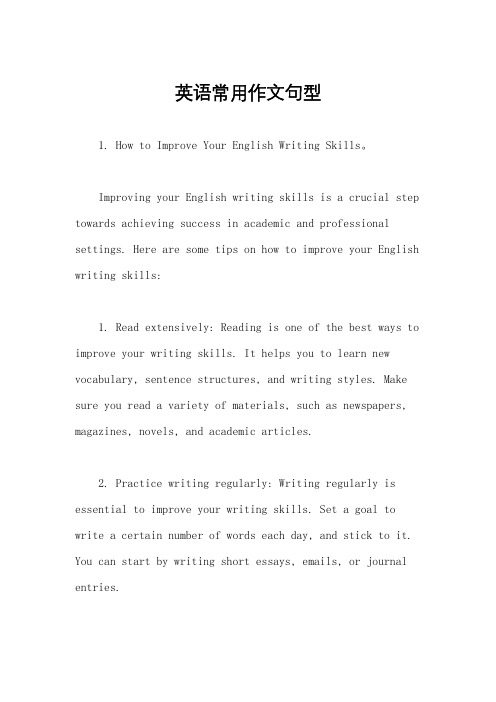
英语常用作文句型1. How to Improve Your English Writing Skills。
Improving your English writing skills is a crucial step towards achieving success in academic and professional settings. Here are some tips on how to improve your English writing skills:1. Read extensively: Reading is one of the best ways to improve your writing skills. It helps you to learn new vocabulary, sentence structures, and writing styles. Make sure you read a variety of materials, such as newspapers, magazines, novels, and academic articles.2. Practice writing regularly: Writing regularly is essential to improve your writing skills. Set a goal to write a certain number of words each day, and stick to it. You can start by writing short essays, emails, or journal entries.3. Learn grammar and punctuation: Proper grammar and punctuation are essential for good writing. Take time to learn the rules of grammar and punctuation, and practice using them correctly.4. Use online resources: There are many online resources that can help you improve your writing skills, such as grammar and spell-checking tools, writing guides, and online courses.5. Get feedback: Getting feedback on your writing is essential to improving your skills. Ask a friend, teacher, or tutor to read your writing and provide constructive feedback.By following these tips, you can improve your English writing skills and achieve greater success in academic and professional settings.2. The Benefits of Learning a Second Language。
(完整)英文作文常用句型(可以背诵一些万能句,方便随时使用)

英语作文常用句型1。
Nowadays there is a common phenomenon that……2。
As is often noticed by people, nowadays, ……3. Recently there has been a tendency/ trend that……4。
In recent years, you may easily notice that ……1. Nowadays there is an increasing concern over a problem /phenomenon that……2。
Speaking of/when it comes to……, some people hold the opinion that……while others have a different attitude/are apposed to the idea。
3。
Gone are the days when …(从句过去时), and nowadays you will notice that…There is a picture/chart/table which shows that……According to the picture/chart/table, ……The picture/ chart/ table reminds us of a phenomenon/problem that…或:We may easily associate the picture with a phenomenon /problem that…First of all,/To begin with,/In the first place,…Besides/ Apart from that/In addition,/ What’s more,/ In the second place,…On one hand… on the other hand…On the part of A…… On the part of B……Last but not least/Another point I want to emphasize is that …To conclude / In conclusion / In a word / In short / All in all / Therefore,…1. It is high time that…(注:从句虚拟语气,时态后退一步)如:it is high time that we took measures to protect the environment。
英语写作常用句式

英语写作常用句式
英语写作是学习英语的重要环节之一,而掌握一些常用的句式则能够帮助我们更好地表达自己的意思。
以下是一些常用的英语写作句式:
1. 引出话题:In my opinion, ... / As far as I am concerned, ...
2. 表示原因:There are several reasons for this phenomenon. / This is due to the fact that ...
3. 表示结果:As a result, ... / Therefore, ...
4. 表示对比:On the one hand, ... On the other hand, ...
5. 表示让步:Although ..., ... / Even though ..., ...
6. 表示建议:It is high time that we took effective measures to solve this problem. / I suggest that we should ...
7. 表示总结:In conclusion, ... / To sum up, ...
8. 表示强调:What's more, ... / Furthermore, ...
9. 表示例证:For example, ... / Take ... for instance.
10. 表示定义:In my view, ... / From my perspective, ...
以上这些句式都是非常实用的,可以帮助我们在写作时更加流畅地表达自己的观点和想法。
当然,除了这些句式之外,还有很多其他的句式可以使用,具体要根据不同的写作内容和情境进行选择。
- 1、下载文档前请自行甄别文档内容的完整性,平台不提供额外的编辑、内容补充、找答案等附加服务。
- 2、"仅部分预览"的文档,不可在线预览部分如存在完整性等问题,可反馈申请退款(可完整预览的文档不适用该条件!)。
- 3、如文档侵犯您的权益,请联系客服反馈,我们会尽快为您处理(人工客服工作时间:9:00-18:30)。
英语写作训练方法之常用句式(doc 9页)英语写作训练方法之——常用句式开头:When it comes to ..., some think ...There is a public debate today that ...A is a commen way of ..., but is it a wise one? Recentaly the problem has been brought into focus. 提出观点:Now there is a growing awareness that...It is time we explore the truth of ...Nowhere in history has the issue been more visible. 进一步提出观点:... but that is only part of the history.Another equally important aspect is ...A is but one of the many effects. Another is ... Besides, other reasons are...提出假想例子的方式:Suppose that...Just imagine what would be like if...Some people may neglect that in fact ...Others suggest that...Part of the explanation is ...进行对比:The advantages for A for outweigh the disadvantages of... Although A enjoys a distinct advantage ...Indeed , A carries much weight than B when sth is concerned.A maybe ... , but it suffers from the disadvantage that...承上启下:To understand the truth of ..., it is also important to see...A study of ... will make this point clear让步:Certainly, B has its own advantages, such as...I do not deny that A has its own merits.结尾:From what has been discussed above, we may safely drawthe conclusion that ...In summary, it is wiser ...In short...名言警句:在作文中引用合适的名言警句,会给你的文章增色许多。
这里收集了我本人喜爱的一些名言,可能会对你有用。
我们使用引用的位置可以在开头结尾或正文段落中,常见的使用形式如下:One of the greatest early writers said ..."Knowledge is power", such is the remard of ..."......". That is how sb comment ( criticize/ praise...). "......". How often we hear such words like there.高分经验谈:我的考研英语高分复习法2004年考研成绩中,我的英语是81分。
有点意外,本来以为只有70多,可能是作文和翻译给分较高。
单词也有风格化英语复习不管谁都会强调单词,但是强调的侧重点不同,如果所有单词都要背,那半年就只有复习这个了。
我追求的是花最少的时间取得最理想的成绩??我用的单词书是新东方出的四六级词汇表,再配两盘磁带。
个人觉得用这样的单词读本,每天早晚巩固一次就可以了。
当然,系统背单词的过程应该在 8 月份就完成。
接下来就是背概率统计的词频表了。
属于词频表性质的单词书不多见,我只见过两本??一本是 smart 学校编的很薄的小册子,只有单词和解释;另一本是上海交大出版的,编者姓王。
我推荐这本??因为它内容详细,例句都是从历届考题的原句中挑选出来的,在背单词的过程中可以给你潜移默化的影响,起到熟悉考研英语风格的作用。
阅读是重头戏阅读是英语考试里的重头戏??每个人都很重视。
在比较吴永麟的阅读 100 篇和石春桢的阅读 220 篇哪个更好的过程中,我发现新东方的考研阅读更胜一筹。
新东方考研有一套资料??其中阅读为两本,一本是历年真题和其中的单词难句注释,还有一本是练习和真题思路分析。
新东方的资料对真题总结分析地很透彻。
结合网络课堂的 flash 课件,几乎题题有来路,对每个答案都有合理的解释,所总结的原则也适用于考场。
但在使用这套资料的时候,要注意自己一定要在真题上运用体会,并把资料上的内容变成自己体会的东西。
我个人认为听力与人的天分有关,一般情况下在短时间内飞速提高是很难的。
所以我除了做真题和模拟题时听听力,平时很少复习过听力。
考完后我估计应该在 13 分左右。
新东方的翻译写得有特点。
关于翻译的书我也只见过这一本。
我的意见是待单词积累到一定基础后再复习翻译,否则有很多东西体会不到。
作文复习放最后作文的复习要放到最后,考前一个月复习为佳。
可以用新东方的作文资料,考试虫的万能作文也行。
但作文一定要自己动手写,否则考试时要吃亏。
在书的选择上,历年真题可以用洞穿考研的资料。
它虽然没有特别之处,但在详尽上则占了上风。
相对而言在这一点上恩波的资料就差一些。
最后考试中心的考试分析推荐应该仔细研究,重点注意它的阅读分析和翻译扣分点。
总的复习资料我推荐毕金献的模拟题。
他的阅读很难,也较有争议性,但个人认为很不错。
新东方老师意见:英语单词应当复习 3 遍左右。
第一遍:此时如果你还没开始的话??从现在往后一个月复习为佳。
第二遍:暑假最后半个月时间。
第二遍是指突击大规模的巩固单词。
第三遍:在考前半个月到一周时间内完成。
背单词应找一本较薄的书,所谓的厚书实际上是出版商的策略,而且会从精神上打垮你。
关于作文,我认为应当从现在就着手。
强度不用太大,每周写一篇就够了。
但要把他们都收集起来以备日后修改复习,总的来说自己写 20 到 25 篇就差不多了。
阅读应当严格按照真题展开,熟练这几年所有的真题,能背下几篇最好。
另外要适当展开泛读,储备自己的知识面,这些在考试的时候都有好处2005年考研英语阅读、翻译备考要点有的放矢突破阅读阅读是考研英语的重头戏,从很大程度上说,考研成败在此一举。
阅读的分值比重大,复习时可以阅读为重点,带动完形填空和英译汉,同时兼顾写作和听力。
阅读没有什么诀窍,但有一定的技巧,靠的是平时的训练,持之以恒,熟能生巧,形成良好的语感。
特别是阅读新题型:完形填空和阅读理解的结合,7选1,如果没有一定的阅读实力,无论什么方法技巧都不管用。
阅读不像背生词那样可以很快见效,不是几个星期就能突击起来的。
考生平时可通过阅读英语原文报纸期刊、六级以上或研究生英语精泛读教材来提高阅读能力。
对于考生阅读中出现的主要问题,归纳起来有三点:一是读不懂,二是速度慢,三是准确率低。
考生应针对自己的具体情况作相应的复习准备。
如果自己属于第一种情况,读不懂,这主要是语法词汇问题造成了阅读障碍,可在解决了词汇量的基础上,集中精力做句法分析,将历年考研阅读、翻译重新做一遍。
先解决长难句的理解问题,理清句式结构,译出原文的每一个字句,然后再考虑速度。
这种做法刚开始可能速度很慢,不过一旦上了路,情况就会大为改观。
如果属于第二种情况,速度慢,这主要是词汇和阅读习惯问题,需要掌握一定的阅读技巧。
可采取精、快读分头训练、相互结合的方式。
譬如说,在某一特定复习期间进行精读训练,重点放在把握句子语法结构、准确理解词语意思上,然后转入快读训练,重点放在捕捉信息,把握要点上,限时完成,逐步加快速度。
精读要尽量细,力争读懂每一个词,快读要尽量准,努力把握文章的要点、信息。
最后将二者结合起来,在精和快之间取一个中数,也就是考试所需有把握的阅读速度。
对于第三种情况,准确率低,问题的关键是考生把握信息的能力不强,弄不清文章中哪些是主要信息,哪些是次要信息,哪些是冗余信息。
建议这类考生根据每次错误的情况认真总结经验教训。
最好的办法就是将最近5年的考研真题仔细阅读,认真分析。
因为这些阅读试题的命题是经过多位专家反复推敲形成的,无论是文章内容还是问题的设置都具有很好的指导意义。
有些考生常常抱怨说,有时候全看懂的文章出错多,一些看不太懂的文章反而错误比较少,这是为什么呢?这里面有两方面的因素。
一是主观原因,所谓能看懂,看懂到什么程度?懂其大意、细节还是深刻的内在含义?打一个比方,高考语文的阅读,几乎没有哪个考生会抱怨说看不懂,而能在阅读上不扣分的却寥寥无几。
其次是客观原因,题目的干扰性大,文章内容易懂,题出得难,弦外之音不容易辨析。
考生不清楚出题者的意图,把握不好题意,一不小心就掉进了干扰陷阱。
对这种情况不妨送大家四句话去慢慢琢磨体会:动脑筋,多分析,抓主线,排干扰。
透彻理解通顺翻译翻译的关键是准确理解,通顺表达。
历览近10年的研究生入学翻译试题,我们不难发现,考题往往有这样几大特点:首先,划线句子的结构都比较复杂,指代关系不能一眼就看出来,需要考生根据上下文去寻找替换词语;其次,需要翻译的句子里往往带有一些成语、习惯表达句型,不能采用字对字的直译方法来处理;第三,由于英汉表达习惯上的差异,对有些词语需要根据汉语表达的需要进行增减、调整、转换或引申处理。
应当怎样准备翻译考试呢?我们认为,平时要结合阅读理解训练来加强语感,把握好句式结构与重心,着重解决长句、难句的翻译。
做到读不懂不罢休,读懂了,再动手译。
考试时,要冷静细心,不要拿着题就急匆匆拼命往前赶。
可先用2-3分钟时间通读全文,理出每一划线句的主谓结构,搞清句与句之间的主次关系,各个意群之间的修饰关系,然后在靠近英语原文的位置用铅笔简要地译出主、谓、宾等关键词语,即先从整体上领会原文的意思,把握好句式结构,然后再动笔翻译一气呵成,将构思好的译文写到答题卡上。
只要理解透彻,表达清楚,考分自然低不了。
如果翻译题中有不认识的生词怎么办?最好不要直接将原词硬抄上去,更不要放弃全句的翻译,可以根据上下文推断出该词的大概意思。
